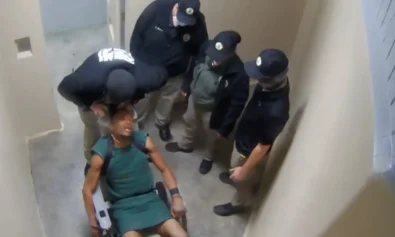
Attorney Clark Kent Ervin testifies on Capitol Hill in Washington. Ervin resigned earlier in 2017 as lead monitor of the team overseeing reforms in Ferguson, Missouri, as part of a consent agreement between the St. Louis County town and the U.S. Department of Justice. Ferguson leaders say they’ve spent nearly $500,000 to pay the monitor team but have little to show for their money, in part because Ervin failed to live up to key promises. (AP Photo Manuel Balce Ceneta, File)
FERGUSON, Mo. (AP) — Ferguson, Missouri, has paid nearly a half-million dollars to the monitor team overseeing its police and court reforms, but city leaders question what they’ve gotten for their money, especially after the departure of the original lead monitor.
Washington attorney Clark Kent Ervin resigned in September after serving a little over a year as lead monitor overseeing the consent agreement between the U.S. Department of Justice and Ferguson, the St. Louis suburb where Michael Brown was fatally shot by a police officer in 2014. Boston attorney Natashia Tidwell, who has been with the Ferguson monitor team since its start, now leads it.
Concerns over the cost of monitoring were detailed in exclusive interviews with The Associated Press.
The money spent on monitoring is costly in Ferguson, paid for entirely with city funds. The community of 20,000 is much smaller, with far less money, than most cities subject to Justice Department consent agreements. Money is so tight that Ferguson voters twice in 2016 approved tax increases to keep the budget balanced.
Mayor James Knowles III said Ervin failed to follow through on some projects, including opening an office in Ferguson and surveying residents. City Attorney Apollo Carey said his departure slowed a court audit and other reforms.
“It begs the question: What are residents getting out of (monitoring)?” Knowles said. “They’re supposed to be getting transparency. They’re supposed to be getting regular updates and engagement from the monitor. They haven’t gotten any of it.”
City Manager De’Carlon Seewood said “there were a lot of concerns on both sides,” which led to Ervin stepping down. “The thought was it was best to depart,” Seewood said.
Ervin did not respond to phone and email messages seeking comment.
Ferguson fell under Justice Department scrutiny after Brown was killed by Ferguson officer Darren Wilson during an Aug. 9, 2014, confrontation on a neighborhood street. A St. Louis County grand jury and the Justice Department declined to charge Wilson, who resigned in November 2014.
But the shooting of the black, unarmed 18-year-old by the white officer drew attention to allegations about mistreatment of African-Americans by Ferguson’s police and court system. A Justice Department investigation led to a civil rights lawsuit that was settled in 2016 with the consent agreement.
The agreement calls for reforms such as hiring more black officers, requiring diversity training for police, and court reforms that include easing financial burdens for minor offenses such as traffic violations. The process is expected to take up to three years with oversight by a team of independent monitors.
Nine teams applied to perform the monitor duties. In July 2016, the Justice Department and Ferguson leaders chose the team led by Ervin, a former inspector general for the State Department and Homeland Security.
The agreement called for paying the eight-member monitor team up to $350,000 a year, with the total amount to be capped out at $1.25 million over five years. Ferguson paid $350,000 for the first 12-month period, and has paid another $145,000 since July of this year, its records show.
Of the initial $350,000, $291,192 was paid to Ervin’s law firm, Squire Patton Boggs, according to Ferguson records. It isn’t clear if Ervin received all of that money or if some was shared with other monitors or assistants, Seewood said. The agreement called for Ervin to be paid $685 per hour and work up to 30 hours a month on the monitoring, which would amount to $246,600 over a full year.
Since July of this year, an additional $108,000 has been paid out to a data collection firm, along with $21,000 to Tidwell and $15,000 split between two other monitor team members, Knowles said.
At a community meeting last December, Ervin pledged to conduct a survey of residents and to open an office in Ferguson. The survey never happened, and no office ever opened.
Knowles said the survey “should have been done in the first year and it wasn’t done. You can’t have a baseline survey of the community to see how it feels about progress if you don’t know what the baseline is.”
The proposal to open an office, Seewood said, was aimed at adding transparency to the reform process.
“I offered to give him an office at City Hall,” Seewood said of Ervin. “For some reason he was never able to make that commitment that he should be here.”
Carey, the city attorney, said during a town hall meeting last week that Ervin’s resignation has slowed reform efforts. He cited a court audit performed in August that remains incomplete.
Justice Department attorney Jude Volek said at the meeting that progress is being made despite Ervin’s resignation, aided by the fact that Tidwell has been involved in the process since day one.
“You can see her commitment,” Volek said.
Tidwell, who is a former police officer and federal prosecutor, declined comment through a spokeswoman.
Seewood also has high hopes for the team’s new leadership.
“She’s awesome,” he said of Tidwell. “I’m very optimistic.”


